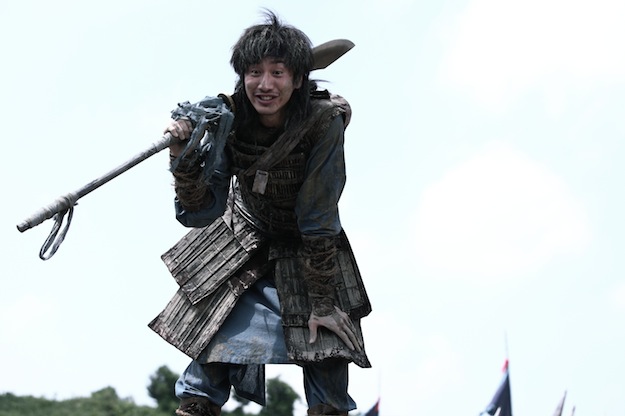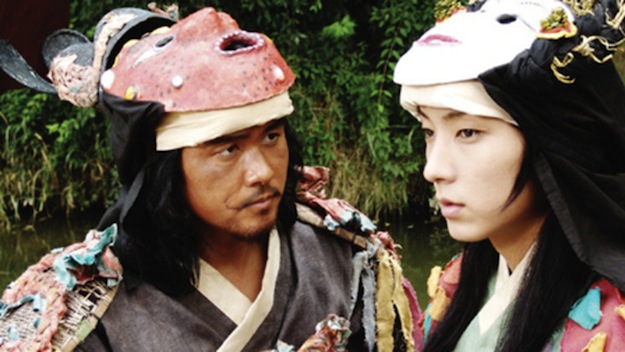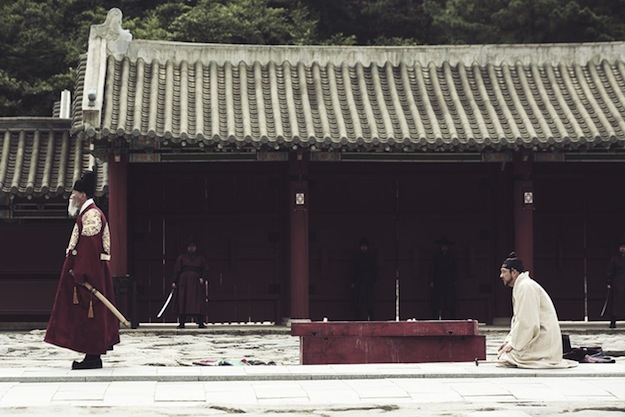Battlefield Heroes In Hollywood, the second a movie features an actual real live historical figure doing actual real live historical things, many great directors start stammering and stuttering, apparently full of fear over what their seventh-grade history teacher will think if they get something wrong. Their historical movies are sapped of vitality, transformed by over-caution into historical dioramas filled with clacking, waxwork dummies stuffed with sawdust. Steven Spielberg’s movies like Amistad and Lincoln are particular offenders, but Martin Scorsese lost his mojo with Gangs of New York, Clint Eastwood’s Invictus and J. Edgar are sheer tedium, and if you’re having trouble sleeping I’d suggest any major motion picture about the American Civil War, such as Gettysburg, Gods and Generals, or The Conspirator. This begs the question: what does Lee Joon-Ik know that all these Oscar-winning filmmakers don’t? Lee is one of South Korea’s more political directors, but instead of making movies about timely issues set in the present, he’s turned out seven rowdy, boisterous, funny, heart-breaking movies set in the past. Sunny (08) and this year’s Dongju: The Portrait of a Poet are set during the Vietnam War and World War II, respectively, but three of his others are set during the Joseon dynasty (1392-1897) and two are set in the 7th century. You’d think they’d be full of stiff gowns and “prithees” and “marry sir, I prays” but these five movies are some of Korea’s most popular films, and some of its most political. Lee got his start with a Home Alone knock-off set in a shopping mall called Kid Cop (93) which caused him to immediately give up directing and go into distribution and producing for a decade. So he was deeply immersed in the realities of budgets and audience tastes when he directed his second flick Once Upon a Time in a Battlefield (03) a historical epic set in the 7th century about the conflict between the Chinese-backed Shila dynasty going to war with the Baekje dynasty. Packed with dialect jokes, profanity battles, and gleefully puncturing the pomposity of historical figures, the movie was a hit that turned Lee into Korea’s in-house master of the historical film. In Lee’s hands, Korean history is full of man-on-man romance, puppet shows, sex jokes, musical numbers praising rice, and farm animals launched from catapults. He’s one part Monty Python’s The Life of Brian and two parts Terry Gilliam’s Jabberwocky. His real-life historical figures aren’t animatronic waxworks like the Daniel Day Lewis-bot in Lincoln, jawing away his famous quotes while audiences squint at the wall label next to his exhibit. Lee’s people get hungry and horny, angry and awkward. Pomposity is forbidden. Reverence is not allowed. Oddly enough, his movies are deeply influenced by Western literature, especially Shakespeare’s fool characters. “After all,” Lee said in an interview, “the father of Cinema is literature, and the father of literature is Shakespeare.” Shakespeare’s fools came in many different flavors, from the rude mechanicals of A Midsummer Night’s Dream, to the tragic Falstaff in Henry IV, Part 1 & 2, to the fool in King Lear who speaks truth to power. Each one is an average man whose bodily appetites and common sense stand in direct contrast to the epic action unfolding around them, whether they’re bumbling into the grand passions of Midsummer, avoiding the mighty battles determining the fate of a nation in Henry IV, or undermining Lear’s operatic wailing. They prick pomposity and bring the action back down to earth. In Once Upon a Time in a Battlefield the fool is real-life Korean hero, General Gyebaek (Park Joong-Hoon), who only agrees to save the kingdom after his king gets him drunk. In that movie’s sequel, Battlefield Heroes (11), the fool is Thingy, a soldier so poor he doesn’t even have a name, talking his way out of suicide missions and trying to survive the clash of history going on all around him, only interested in going home and filling his belly. Lee’s Blades of Blood (10) is his swordplay movie, a savage epic about an attempted coup that stemmed from Lee’s rage at the right-wing direction Korean politics was taking and his belief that maybe it was better to destroy the entire country. But even in a movie fueled by such devastating anger, there’s Hwang Jung-Min, a blind swordsman who’s unpredictable and earthy, a grinning gremlin who sows chaos wherever he goes, one part Zatoichi and one part Puck.
King and Clown Lee’s most Shakespearean movie is King and Clown (05), which puts a group of fools front and center. Some wandering players catch the attention of King Yeonsangun, considered the worst tyrant of the Joseon dynasty, by staging a street show mocking his infatuation with his main concubine. Their version of the king is a warty-faced moron with an engorged penis dangling between his legs who meets his queen while she’s taking a shit. The performers are arrested and brought to the palace to perform their burlesque in front of the king himself; if they can’t make him laugh, they’ll be executed. Not only does Yeonsangun laugh, he becomes infatuated with these rustic buffoons, joining in their performances and falling in love with Gong-Gil, the beautiful boy who plays their female roles. Every character in this film is a grotesque, from the dark-skinned, buck-toothed, earthy players, to Yeonsangun himself with his sadistically fickle moods and his dyed beard. It’s a filthy movie, full of barfing and humping, and references to women’s “bearded pounches.” But it’s also a serious film depicting the devastating impact state power has on the common man. It even takes time out to affirm Yeonsangun’s essential humanity, as he finds an emotional outlet in the tiny puppet shows he stages for Gong-Gil, based on incidents from his emotionally deprived childhood. After retiring from filmmaking in 2011 because Battlefield Heroes flopped (“Congratulate me. I’m quitting directing because the audience [for Battlefield Heroes] was just 1.7 million, far fewer than the 2.5 million we had expected,” he tweeted) Lee came back. “Retirement was a shameful decision. I won’t speak of it ever again,” he said in an interview. In 2015 he delivered another historical film, The Throne, which became the sixth-highest grosser of the year, beating out Mission Impossible 12 and Jurassic Planet. This time out, it wasn’t Shakespeare who provided the inspiration, but Aeschylus’s Oresteia. Troubled by the growing gap between young and old, and viewing the young as too reckless but the old as too greedy, Lee channeled his frustrations into the well-known story of Prince Sado and King Yeongjo. Set in the Joseon Dynasty, the King (played by Song Kang-Ho) is a micromanaging prig with an inhuman commitment to the law. His son chafes under his heavy hand and eventually plans a coup, but changes his mind at the last minute and calls it off. However, this act of disloyalty cannot go unpunished lest it destabilize the kingdom, and so the King locks his son in a rice chest without food or water and, over the course of eight days, lets him die in the summer heat.
The Throne As in the Oresteia, we know tragedy is on the horizon right from the first frames, and it’s Prince Sado’s character flaws (his need for acceptance) and the King’s flaws (his need for order) that bring on their downfalls. But, like a Greek tragedy, it’s the entire world that’s stacked against them. Instead of Gods pushing men around like chess pieces, in The Throne it’s the ironbound laws and the byzantine court rituals that crush human souls. Citing the wisdom of his ancestors, the King claims that it’s best to raise your children as if they’re your enemies because one day you might have to slay them, and etiquette becomes downright surreal as it consumes itself, sometimes demanding contradictory manners be deployed at the same time, and this algebra of etiquette has to be carefully calculated to avoid offense. Lee’s movies demand a more human, and more humane, reading of history. Anti-authoritarian, his movies thumb their nose at decorum, revitalize the reputations of reviled leaders, and stand up for the common man, all while taking their cues from classic Western literature. And yet they stay light, funny, and fast on their feet. Maybe it’s because at no time does one of Lee’s characters attempt to impart any wisdom. Perhaps if Hollywood movies had more fools and fewer wise men, they might actually be this good.


